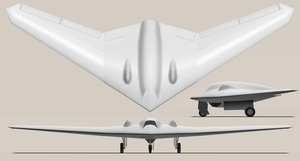Romancing the Drone…
Military renaming and rebranding


Pretty in Pink: public to be reassured by painted drones?
Anyone with even a passing interest in the military soon discovers the peculiar phenomenon of ‘military speak’, in which a spade can never quite be called a spade.
Bombs and bullets are called ’ordnance consumables’, a missile strike or bombing raid is known as a ‘kinetic event’, and despite its offensive purpose, the industry and its business must always be described as ‘defence’. Military speak is essentially about maintaining a psychological distance between the day-to-day sanitized business of planning, preparing (and profiting) from armed conflicts and the awful brutal reality of warfare.
The same coyness over language applies of course to drones. Over the past few years I‘ve lost count of the number of times I been told not to call drones ‘drones’. The current preferred term in the military is ‘Remotely Piloted Air System’ (RPAS) after they rejected ‘Unmanned Aerial Vehicle’ (UAV) as being ‘off message’ (“such a generic term can be unhelpful, particularly when working with an uninformed audience” said the MoD last year).
The term ‘drone’, though widely used and understood by the public and media alike, is snubbed both by the military and those wanting to get a civil drone industry of the ground. Not only is it seen as too dull a name for such a ‘sophisticated piece of kit’ but its association with death and destruction is of course problematic.
This week the Guardian revealed that the Unmanned Aerial Systems Association, a UK lobby group, is planning a public relations offensive to counter the negative image of drones. This website (Drone Wars UK) was cited by the lobby group as part of the problem to be overcome. They recommend that drones deployed in the UK “be decorated with humanitarian-related advertisements, and be painted bright colours to distance them from those used in warzones” As the Guardian reports:
“John Moreland, the general secretary of UAVSA, said the industry was uncomfortable with the word “drones” and wanted to find new terminology. “If they’re brightly coloured, and people know why they’re there, it makes them a lot more comfortable,” he said.
The idea that the public could be persuaded to accept drones by painting them bright colours has rightly been mocked across the blogosphere.
A more serious strategy in the attempt to rebrand drones is for advocates to play up their potential to be used by green or human rights groups. Last week the New York Times carried a think piece arguing that drones should be used to monitor human rights abuses. Like many drones themselves however, the idea has come crashing down to earth after being comprehensively rubbished by human rights advocates (see the excellent post from Laurenist and also from Mark Kersten). Even one noted supporter of drones, @drunkenpredator, ridiculed the idea on twitter.
Drones do not have a negative image because of the work of Drones Wars UK, but because of the awful impact that they have in Afghanistan, Pakistan and elsewhere, and because of the serious concern that remote warfare will mean more warfare.
The public will not be reassured by any renaming or rebranding exercise. What is needed is for the legitimate concerns about drones in warfare and their impact on civil liberties to be taken seriously.

